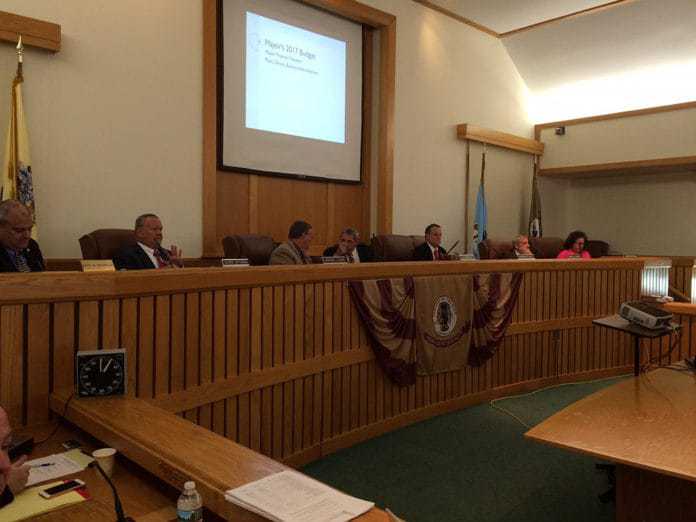
TOMS RIVER – A proposed budget carrying a tax increase of less than a penny was scrapped by council members who pushed for an amended budget that would result in a flat tax rate this year.
The budget had first been introduced a month ago. It contained a tax increase of .88 cents per $100 of assessed valuation. On the average home in Toms River, it would have led to an increase of $23.70 a year, Business Administrator Paul Shives said.
However, after his budget presentation on April 18, Township Council members said they wanted the budget cut so that there would be no increase in municipal taxes.
Four of the seven council members are running for office this year.
Shives then presented a list of places where almost $1 million could be cut to get to a flat tax. He said after council members had voiced their opposition to the budget last month, he went back to look for additional cuts. Additionally, the town received a few fortunate circumstances when insurance costs for the year came in $800,000 less than expected. The other cuts are from the salaries and wages line items in the following departments:
Building: $25,000
Clerk: $10,000
Law: $3,000
Engineering: $20,000
Economic development: $7,000
Director of Buildings and Grounds: $20,000
Social Security: $20,000
Roads: $20,000
Sanitation: $15,000
Recycling: $10,000
 Since the budget is being amended, there has to be another public hearing for it before it is adopted. This is scheduled for the April 25 Township Council meeting, at 6 p.m. at Town Hall.
Since the budget is being amended, there has to be another public hearing for it before it is adopted. This is scheduled for the April 25 Township Council meeting, at 6 p.m. at Town Hall.
The total proposed budget will now be $125,100,831. This is an increase of $526,543 from 2016’s budget of $124,574,288.
The tax levy would be $81,559,694, an increase of $161,952,466 from 2016’s $80,392,772.
Councilwoman Maria Maruca credited the administration for all the hard work that went into the budget, but was opposed to seeing any increase, since the school district and county freeholders were also having increases. She was the first council member to comment on the proposed budget, and the rest of the council members had their chances to comment. They all agreed that a cut was needed, to some extent. Some suggested holding off on hiring, or not replacing staff without first vetting whether the position needs to be refilled.
Councilman Maurice Hill was one of the council members who agreed with the need for the budget to remain flat, but warned that a zero budget will impact future budgets and the ability to recover from emergencies.
Shives said the $800,000 windfall from the insurance line items is a great boon, but he was afraid that it is a one-time fix that might be felt in the future. Next year, for example, if the insurance costs increase in the double digits, it will hurt that much more. That $800,000 would have been used as a cushion for emergencies throughout the year, or surplus to be used to offset the following year.
Still, even with the changes in the budget, some factors were still the same.
This will be the first year without state and federal aid that came after Superstorm Sandy, Shives said. The township had been preparing for this, as the aid had been declining every year.
More than 35 percent of police officers, 58 in total, retired in the last six years. The budget reflects the administration’s intention to keep the complement of officers at 160.
Township departments have an “other expenses” line item that is used to pay for any miscellaneous costs throughout the year. Those line items have been frozen at the same amounts for a few years, causing each department to do more with less, Shives said.







